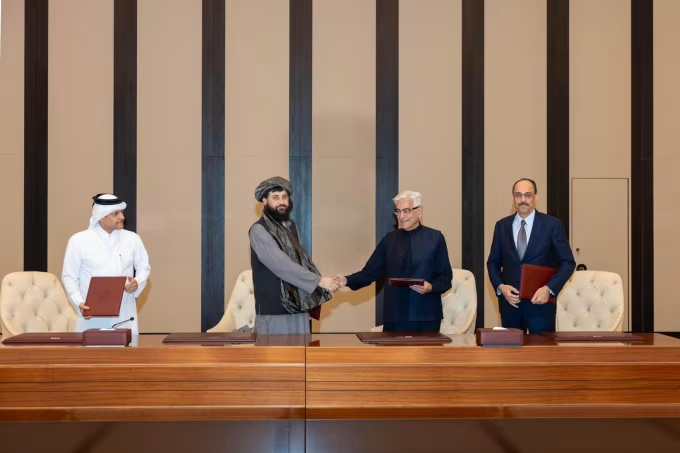Doha, Qatar — Pakistan and Afghanistan have reached an immediate ceasefire following more than a week of deadly clashes along their disputed 1,600-mile border, Qatar’s foreign ministry confirmed early Sunday. The two countries agreed to halt hostilities and work toward “lasting peace and stability” in negotiations mediated by Qatar and Turkey.
The latest fighting marks the most serious escalation between the neighboring countries since the Taliban returned to power in Kabul in 2021. Violence erupted on October 10 after Afghanistan accused Pakistan of conducting airstrikes in Kabul, prompting retaliatory attacks. Pakistan, in turn, has long accused Kabul of harboring members of the Pakistani Taliban (TTP), a claim consistently denied by the Afghan Taliban.
As part of the ceasefire agreement, Afghanistan has pledged not to support groups conducting attacks against Pakistan. Both sides have also committed to avoiding strikes on each other’s security forces, civilians, and critical infrastructure, according to Taliban spokesperson Zabiullah Mujahid.
Earlier this week, Pakistan and Afghanistan had agreed to a 48-hour ceasefire, which was extended Friday to allow for diplomatic mediation. However, sporadic violence continued, raising concerns over civilian safety.
Ahead of the Doha talks, a high-level Afghan delegation, led by Afghanistan’s defense minister, traveled to Qatar. The Taliban accused Pakistani forces of targeting civilian areas in the border province of Paktika. Afghanistan stated that while it reserves the right to respond to violations, its forces have been instructed to refrain from new operations during the negotiations.
Pakistan’s Information Minister, Attaullah Tarar, defended the military’s actions, stating that security forces struck “verified” militant camps along the border and denied targeting Afghan civilians. He also claimed that militants attempted attacks during the ceasefire period, which Pakistan successfully repelled, reportedly killing more than 100 fighters, though these figures have not been independently verified.
Civilians have borne the brunt of the recent clashes. In Paktika, a Pakistani attack killed eight people, including three Afghan cricket players. According to the Afghanistan Cricket Board, the players were targeted while attending a gathering after a friendly cricket match. In response, Afghanistan announced it would withdraw from a three-nation T20I cricket tournament involving Pakistan and Sri Lanka.
The escalation highlights a growing regional security concern. Pakistan, historically a backer of the Taliban during its insurgency against the US-backed Afghan government after 2001, now faces threats from the TTP, which has conducted over 600 attacks against Pakistani forces in the past year, according to the nonprofit Armed Conflict Location & Event Data Project (ACLED).
Since the clashes began, at least three dozen Afghan civilians have been killed, and hundreds more wounded, according to the United Nations Assistance Mission in Afghanistan (UNAMA).
The Doha-mediated talks provide a critical opportunity for both sides to enforce the ceasefire and prevent further violence along the border. While tensions remain high, the agreement is being viewed as a potential turning point for stabilizing a historically volatile relationship marked by decades of mistrust, cross-border militancy, and political friction.
The international community, including US policymakers, will likely watch the situation closely, given the strategic importance of Afghanistan and Pakistan in regional security and counterterrorism efforts. The coming weeks will be crucial in determining whether the ceasefire holds and whether both nations can move toward a sustainable resolution of their longstanding disputes.

